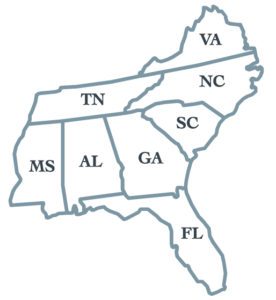you ASKED
FREQUENTLY ASKED QUESTIONS

we ANSWERED
SOUTHEASTERN U.S. DELIVERY FAQS
Q: What states are considered part of the Southeastern United States?
We ship for free to these states: Virginia, North Carolina, South Carolina, Tennessee, Mississippi, Alabama, Georgia, and Florida.
Q: When/how do you ship?
We ship in recyclable insulated packaging on Wednesdays via FedEx shipping.
Q: How do you shuck raw oysters?
Here’s a link to a video of demonstrating how to shuck oysters.
Q: I have leftover Oysters. What should I do with them?
Here’s a link to some of our favorite oyster recipes.
Q: How do I store these until I am ready to eat them or if I have leftovers?
Oysters in the shell should be stored below 45 degrees, but not frozen. They’ll do great in the refrigerator for several days after you receive them. Oysters should smell sweet and salty; discard any that are open or have a strong smell. We stand by our oysters 100% and will always gladly refund you if you aren’t satisfied for any reason. We love our oysters and we’re confident that you will, too!
LOCAL DELIVERY FAQS
Q: When & Where do you deliver?
We deliver on Friday and Saturday, plus special holiday dates, throughout McClellanville, Awendaw, Mt. Pleasant, Sullivans Island, and Isle of Palms. If you live outside of this area, we can meet you near the Ravenel Bridge in Mt. Pleasant. Please feel free to text or call us with any questions, 843-259-3013.
Q: How/when do I pay?
All invoices must be paid no later than 5:00 p.m. on the Thursday before a Saturday delivery. When we receive your order, we’ll send you an invoice which you can pay online. Your order will be considered confirmed once you have paid. No unpaid orders are confirmed and therefore will not be loaded onto the delivery truck.
Q: What do I do with the shells after the oyster roast?
Q: I’m nervous. What if you don’t show up?
Q: Is this DHEC approved/safe?
Q: What else do I need for an oyster roast?
Q: How do I cook the oysters?
Cooking oysters is pretty easy. Try steaming by placing the oysters on a grill and covering them with a wet burlap sack or towel. Or position a steel plate over a wood fire, heap the oysters on the steel, then place burlap sacks or towels over the oysters and wet them down. The fire should be large, started well in advance to provide plenty of heat. You can also use a propane burner and steam pots, which I think is the easiest and least messy. The key for any cooking method is to cook the oysters until they just begin to open, and then pull them off the heat source, and serve immediately. Overcooking leads to dry and tough oysters. Call us with any questions; we’re happy to advise! For more info on throwing an oyster roast, please visit http://www.welcomecharlestonsc.com/featured/how-to-host-an-oyster-roast/
Q: Will the oysters be clean?
Q: How many bushels should I order?
Q: Is there a minimum or maximum oyster order?
Minimum order is 1 bushel or 100 singles. There is no maximum order, but please give us as much notice as you can.
Q: Do you sell singles or clusters?
We sell both. Bushels of clusters are $70, and Singles are $100 for a 100 count bag. Delivery is free.

